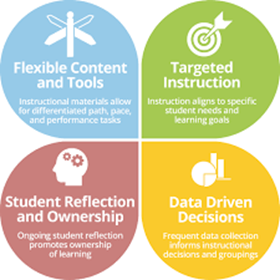e-Learning Ecologies MOOC’s Updates
Discussion forum Update#7 – Personalized learning
The term personalized learning can be defined as an approach that uses various methods to support different types of learners. This type of learning approach can increase motivation, engagement and understanding (Pontual Falcão, e Peres, Sales de Morais and da Silva Oliveira, 2018) maximizing learner satisfaction, learning and efficiency and learning effectiveness (Gómez, Zervas, Sampson and Fabregat, 2014).
Personalised learning is creating learning experiences tailored or specified to the students’ needs. All students learn differently, and many different techniques should be used to engage learners to the content and to ensure effective learning takes place within the classroom. Students should be provided with the correct tools and resources along their learning pathway ensuring that they progress and develop. In many organisations a requirement of a digital infrastructure is identified to support learning which provides various tools to scaffold and support learning.
Ensuring that personalised learning is achieved to its best level many keys’ factors are essential such as clear instructions, differentiation, proactive support and providing real world connections. The personalised model should ensure that the students can face the activities assigned and fit best with the students’ individual strengths, weaknesses, and interests. The role of the teacher then shifts into one of a mentor who ensures that students are given control over their learning and real time feedback is provided for the students to reflect and progress through the course.
[The Core 4 Elements of Personalized Learning - Education Elements]
The image above shows above personalised learning is using flexible content and tools, targeted instructions, data driven decisions which also give the students a chance for reflection and ownership.
As found by P, Grant and D, Basye that technology helps educators to differentiate instructions, deliver meaningful, differentiated instruction and builds students learning capabilities. Using technology ensures that students can receive timely response to online exams as multiple-choice questions can be corrected immediately and results can be shared. Parents and caregivers are given are given direct access to overview the child’s performance on the learning platforms.
Personalised learning in educational settings can be introduced using technology systems to support and map students’ pathways according to the individual students’ profiles. LMS and various computer-based software tailors’ instructional methods and provides differentiation to students. An example of personalised learning using technology is using the LMS system to design tasks for students and giving them options to choose from guiding and letting them decide what methods of learning suits them best. Students can be assigned an assessment on the LMS and choose their topic and then choose how they will present their project from the options of; report presentation, video and multimedia or a choice of their own which should be defined. A discussion forum could be added in the same area marking students for participation in discussing ideas with other students in their class. They are open to ask questions and comment on other students’ ideas and develop their learning from rich discussions and ideas shared. The students would then be expected to submit their assignments to the LMS while given dates and times for submissions.
In teaching and learning practices these days it is essential that personalised learning is recognised and applied when delivering lessons to students. The one-size fits all method is one that should be seen as an old way of delivering content. Every student in the classroom comes from different cultures and environments that should be provided with opportunities to make connections with their own understanding and research and investigate to affirm key theoretical concepts.
References:
*Pontual Falcão, T., e Peres, F. M. A., Sales de Morais, D. C., & da Silva Oliveira, G. (2018). Participatory methodologies to promote student engagement in the development of educational digital games. Computers & Education, 116, 161–175. https://doi.org/10.1016/j.compedu.2017.09.006.
Gómez, S., Zervas, P., Sampson, D. G., & Fabregat, R. (2014). Context-aware adaptive and personalized mobile learning delivery supported by UoLmP. Journal of King Saud University - Computer and Information Sciences, 26(1), 47–61. https://doi.org/10.1016/j.jksuci.2013.10.008.
P Grant and D Basyle (2014). Personalised Learning: A guide for Engaging students with Technology.
Shemshack, A., Spector, J.M. A systematic literature review of personalized learning terms. Smart Learn. Environ. 7, 33 (2020). https://doi.org/10.1186/s40561-020-00140-9


